
While war corporations, or so-called “defense contractors,” make billions in profits, Wall Street is the ultimate beneficiary of today’s nonstop wars. The prosaic nature of war profiteering—far from the work of a shadowy cabal—is precisely why the collusion is so destructive and should be outlawed.
The U.S. ruling class deploys the military for three main reasons: (1) to forcibly open up countries to foreign investment, (2) to ensure the free flow of natural resources from the global south into the hands of multinational corporations, and (3) because war is profitable. The third of these reasons, the profitability of war, is often lacking detail in analyses of U.S. imperialism: The financial industry, including investment banks and private equity firms, is an insatiable force seeking profit via military activity.
The war industry is composed of corporations that sell goods and services to the U.S. government and allied capitalist regimes around the world. Investment banks and asset management firms hold most shares of every major public war corporation.
The best-known financial firms holding the stock of war corporations include: Vanguard Group, BlackRock, State Street, JPMorgan Chase, Wells Fargo, and Wellington Management.
Consider Parsons, a corporation that sells goods and services pertaining to construction, command and control, espionage, and day-to-day military operations. Parsons’ initial public offering in May 2019, valued at roughly $3 billion, earned it an industry Corporate Growth Award. The top holders of Parsons stock are investment banks and asset management firms—including the familiar Vanguard Group, BlackRock, and State Street.

Cyber Wars and Intelligence Go Mainstream as Emerging Corporate Frontiers
New business sectors of war are created and then flooded. For example, the provision of “cyber” was virtually nonexistent in U.S. military contracting until roughly four years ago. A war industry push to militarize IT infrastructure has yielded a bonanza in cyber contracts. Today, “cyber” goods and services are sold stand-alone or as additions to previous contracts.
Nearly every major war corporation sells cyber goods and services.
The top public war corporations include Lockheed Martin, Raytheon Technologies, Boeing, General Dynamics, Northrop Grumman, L3Harris, Textron, SAIC, Booz Allen Hamilton, Leidos, CACI, Honeywell, PAE, Accenture, KBRWyle, Amentum, Jacobs, and AECOM.
They all sell cyber. The main exception is Huntington Ingalls, a major shipbuilder, which does not sell stand-alone cyber goods, although it does mandate cybersecurity as part of its supply chain. The top private war corporations—Sierra Nevada Corp. and General Atomics, run by the billionaire Ozmens and Blue Brothers, respectively—also sell cyber goods and services.
This single business sector of war, cyber, is worth billions annually. Claims of Chinese and Russian cyber hacks, fabricated or hyped by war industry think tanks and media affiliates, fuel government purchases of cyber goods and services. For its part, the U.S. government—first to use devastating new weaponry, from atomic weapons to cyber weapons, and first to attack Moscow with cyber weapons—positions its aggression as purely defensive.

In November 2018, Parsons—whose leadership is packed with bankers, career war profiteers, military and intelligence retirees, and a coal tycoon—was contracted for cyberspace operations mission planning in Centerville, Virginia. In May 2019, Parsons was contracted with nine other corporations to expand the cyberspace backbone of the Naval Information Warfare Center Pacific of San Diego, California, a military unit whose mandate is to dominate all forms of space (cyberspace, airspace, and Earth’s orbit).
In January 2020, Parsons and other corporations were contracted by the same unit to further develop, oversee, and employ broad cyber technology integral to that mandate, from the continental United States, to Guam, Japan, Australia, and Singapore, to Bahrain, Djibouti, and Italy. This is just one example of one corporation. Corporate America blankets U.S. military cyber operations worldwide.
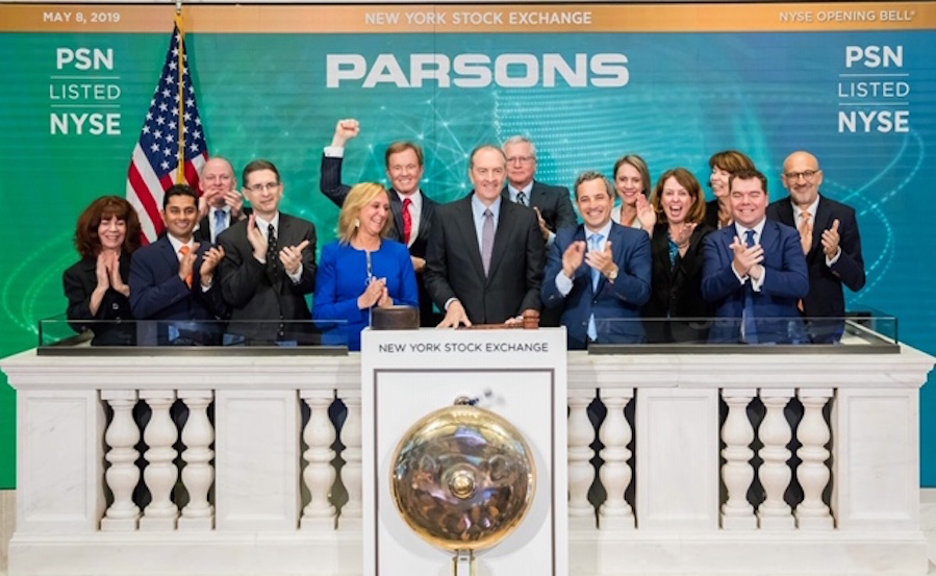
No business sector of war is off limits.
As recently as the early 1990s, it was considered sacrilege for corporate employees (“contractors”) to be involved in intelligence matters. Not anymore. U.S. intelligence (both civilian and military) is corporatized.
Consider the Defense Intelligence Agency. DIA was established in the 1960s to consolidate the military’s disparate intelligence activities. It did not consolidate much, as the individual military branches continued to run distinct military-intelligence operations.
Since the 1960s, DIA has expanded dramatically in size. Corporations carrying out DIA’s activities during the most recent fiscal year included work in its Science & Technology Directorate (five years, $990,000,000), its National Media Exploitation Center, and its Missile & Space Intelligence Center (MSIC).
Parsons carries out modeling and simulation and analysis within DIA’s MSIC. Corporations also run planning and analysis of DIA’s workforce, sell technical support to DIA, conduct employee vetting and background investigations, and work on technology transfer analysis and assessment.

Corporations even develop and run software that aids “in the identification of intelligence requirements, management of priorities, planning and production of intelligence products, enterprise data analytics, communication and other associated processes,” offering further opportunities for profit-hungry entities to steer the espionage ship. Corporations (e.g., Accenture, Booz Allen Hamilton, CACI, General Dynamics, Leidos, L3Harris, ManTech, PAE and SAIC, whose stocks are owned mostly by financial firms) functionally run U.S. military-intelligence, the operations of which ultimately enrich the U.S. ruling class.

Wall Street: the Ultimate War Profiteers
Wall Street plays the foundational role in the war industry by outright owning war corporations. Consider PAE, a subtle, potent corporation, which operates such diverse business sectors of war as vehicle maintenance, base operations, military construction, and military training. Gores Holdings III acquired PAE from Platinum Equity in early 2020. Gores then adopted the name PAE and took PAE public. PAE has since acquired the corporations CENTRA and Metis Solutions, which further increase PAE’s operations carrying out former governmental tasks within the U.S. military establishment and espionage agencies.
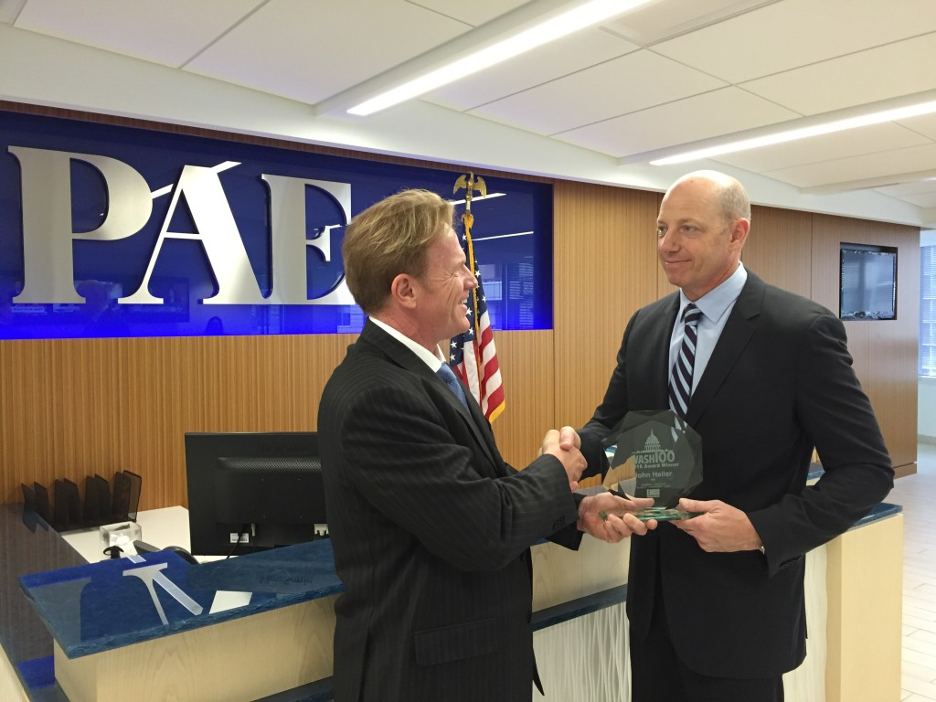
Again, all military and intelligence activity is up for grabs, even the Atlantic Undersea Test and Evaluation Center (AUTEC), a military range for testing and evaluating the war industry’s technology (e.g., anti-submarine weapons, sonar tracking, and communications). Some have nicknamed AUTEC the “Navy’s Area 51” because of the testing of high-tech unconventional weapons. [Area 51 is a testing range in Nevada where classified programs are worked on and experimental aircraft are flown.]
The Navy established AUTEC on Andros Island in the Bahamas to take advantage of the deep oceanic trench that runs along the east coast of the island. PAE is traditionally the go-to corporation that operates and maintains AUTEC, though a newly formed corporation known as Amentum recently took over some of these functions.
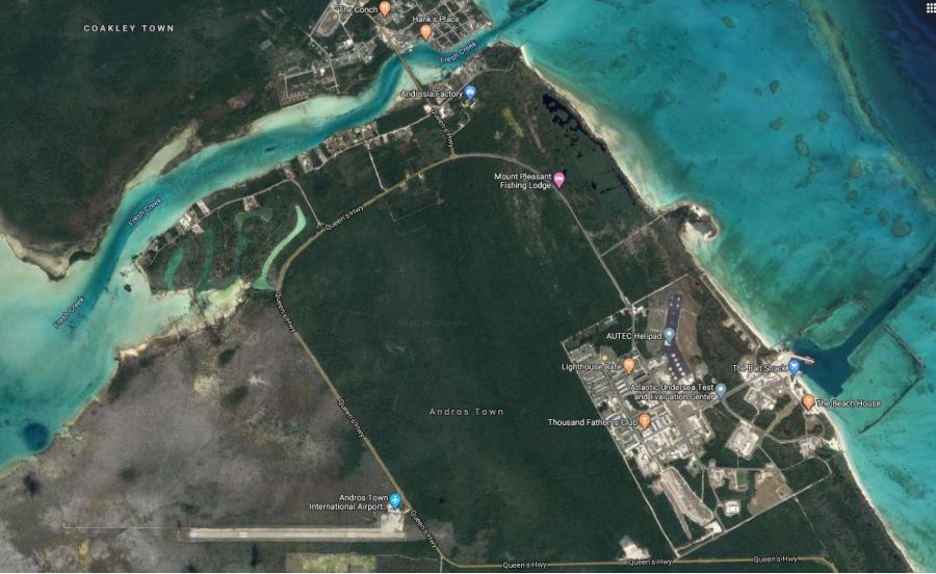
The private equity firm Lindsay Goldberg owns Amentum, which was created in 2020 when AECOM, a massive engineering and project management firm, sold its management services business. Amentum now directs this business. Overseas, this management services business has recently transported equipment, cargo, and personnel around Europe; run logistics for prepositioned matériel in Germany, Kuwait, and Qatar; supported drone operations in the Middle East; and repaired support equipment and helped with maintenance at Navy sites in Comalapa, El Salvador. These operations now all belong to Amentum.
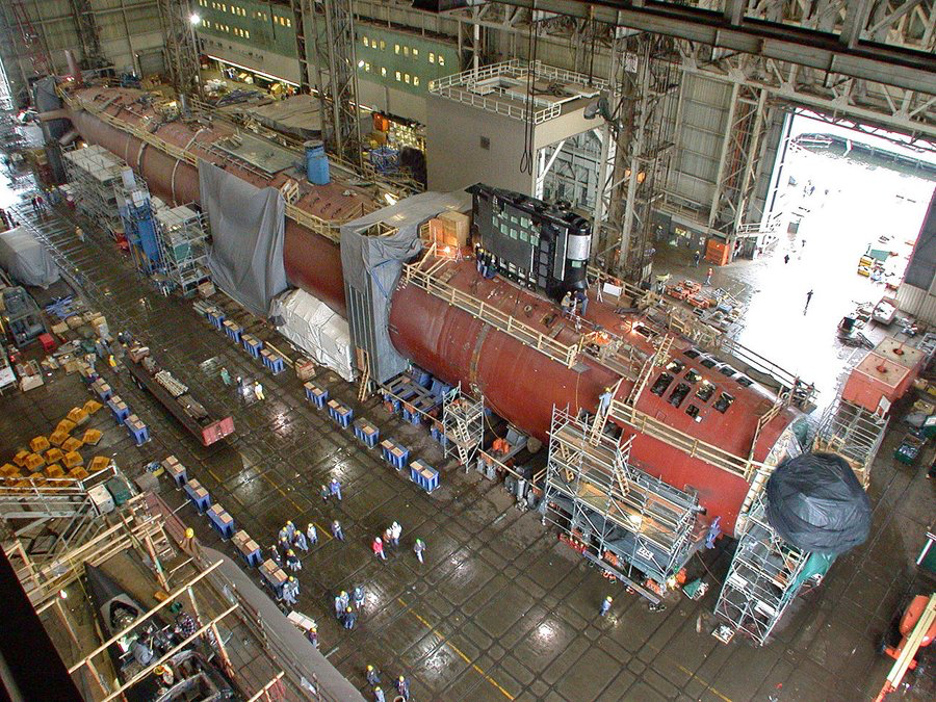
In November 2020, Amentum made another move: It acquired DynCorp, a corporation reported to have a deep history of mercenary activity in Latin America and the Middle East.
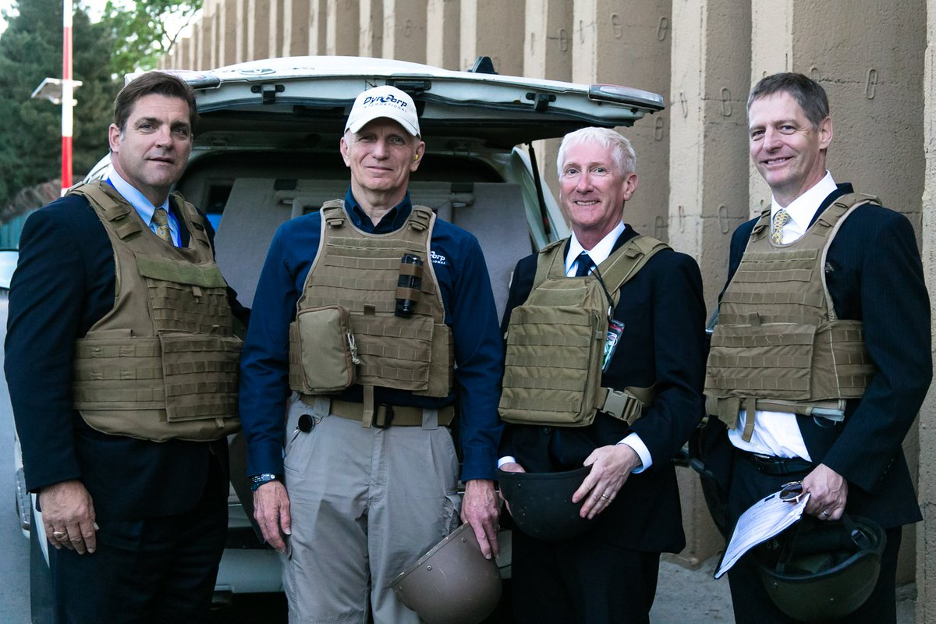
According to contract announcements, DynCorp has recently overseen war reserve matériel in the U.S., Kuwait, Oman, Qatar, and the UAE; maintained military aircraft around the world, including in Honduras, Germany, Afghanistan, Iraq, and Kuwait; sold aircraft maintenance to Sweden and Saudi Arabia; and run substantial worldwide training and equipping of forces, emergency construction, and logistics.
Big Finance wheels and deals war corporations, viewing bases, troops, and warzones as numbers through which to profit.
Another prominent financial player is Veritas Capital, which once owned DynCorp and now owns such corporations as Alion and Peraton, the latter of which is about to acquire Northrop Grumman’s IT business. Peraton’s recent sales to the U.S. military establishment have included: portable systems to foil radio-controlled explosive devices that sundry groups use to attack Western military forces that invade or occupy their countries; work on undersea drones; work to ensure nuclear missiles reenter Earth’s atmosphere properly; IT work that “directly supports American national security interests on the continent of Africa,” according to the contracting announcement; cyber activities for the Air Force Research Lab; and commercial satellite communications for Central Command. All is fair in profit and war.
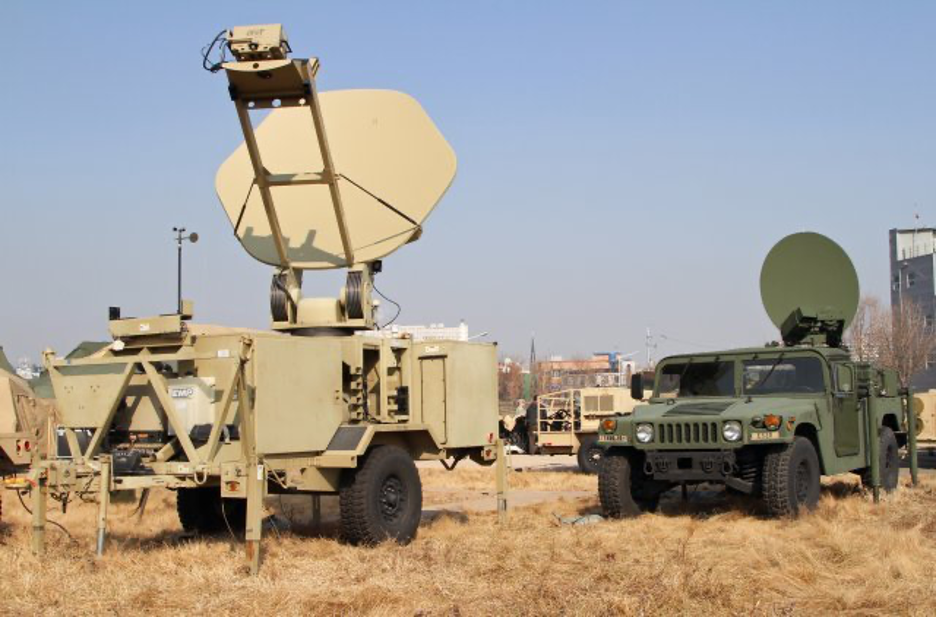
Big Finance sits at the top of the war industry by purchasing most shares of war corporations and by owning war corporations. Insatiable demand for profit places immense structural pressure on the Pentagon and Capitol Hill for sky-high U.S. military and intelligence budgets, broad deployment of troops overseas, and the opening up of governmental jobs to corporations.
The most well-known industry pressure comes in the form of lobbying both political parties and funding their congressional campaigns (with extra focus on members of pertinent committees, such as Armed Services, Intelligence, Appropriations, and Foreign Relations).
This produces tangible results. As Steven Semler of the non-corporate Security Policy Reform Institute calculated, Democratic votes on the National Defense Authorization Act
correlate strongly with the campaign cash members accepted from the war industry. On average, House Democrats who voted for the NDAA accepted four times the amount of war industry cash as those who voted against it. In the Senate, Democrats who cast supporting votes took in six times as much industry cash.
Warmonger-In-Chief
The Executive Branch is not exempt. Rapacious financiers—including hedge fund chiefs and venture capitalists—top the list of donors to the Biden Administration, though dark money groups prevent a full understanding of the overall campaign finance picture. Between July and September at least 67 billionaires and their spouses made contributions of more than $100,000 to committees supporting Joe Biden and the Democratic Party, according to records filed with the Federal Election Commission.

Biden’s campaign received over $9 million from Donald Sussman, CEO of Palmora Partners, a multi-billion dollar hedge fund, which has more than 260,000 shares in Raytheon, a preeminent weapons manufacturer and supplier of weapons to Saudi Arabia, which recently won a $100 million contract for Afghan Air Force training.
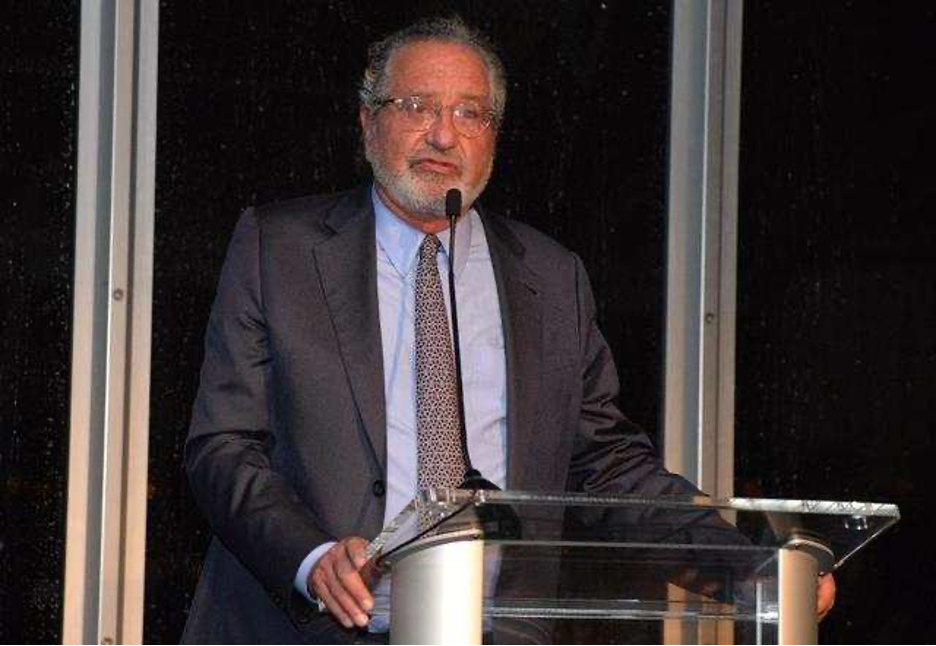
Another of Biden’s top donors, Jim Simons, who gave over $7 million, founded Renaissance Capital, which owns 1.2 million shares in Raytheon worth over $75 million, and 130,000 shares in Lockheed Martin worth $50 million.

Big Tech is positioned prominently among donors to the Biden inauguration celebration. Biden has been clear on the campaign trail that he does not intend to cut the military budget, even going so far as stating, “I’ve met with a number of my advisors and some have suggested in certain areas the budget is going to have to be increased.” Biden’s advisors are part and parcel of the military-industrial-congressional complex. Cozying up to wealthy donors, Biden infamously assured them that “nothing would fundamentally change” in a Biden presidency.
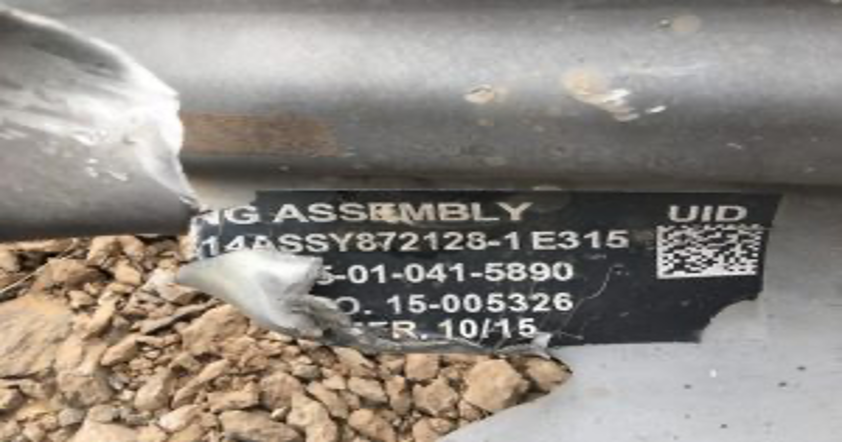
Corporate Media Kool-aid
Corporate media prevent the public from understanding the nature of the problem. A handful of business interests owns media outlets in the United States. Profit drives corporate media. U.S. corporate media (e.g. CNN, MSNBC, FoxNews) share the same business model: air what attracts the highest ratings in order to get more advertising revenue.
Corporate media air info-tainment, designed not to inform or foster critical thinking. Informing the public is not a priority. Maintaining the existing economic order is.
To the extent that corporate media air any information at all, the information reflects the opinions of the ruling class and the dogma of Corporate America.
Politically conditioning the U.S. public, corporate media never blame the military-industrial-congressional complex or capitalism for any of the problems in the world. Aiming for high ratings and lucrative advertising revenue, corporate media self-censor and taper the spectrum of acceptable foreign policy debate. War corporations purchase advertisements on corporate “news” shows to further confine the debate. Corporate pundits and newscasters do not speak out against advertisers.
Corporate media hire career militants (e.g. former CIA Director John Brennan, MSNBC; former CIA Deputy Director Mike Morrell, CBS News; retired General Jack Keane, FoxNews) who further confine the debate. Retired generals and admirals regularly contribute to all forms of corporate media, often without disclosing existing ties to war corporations or financial investments in war.
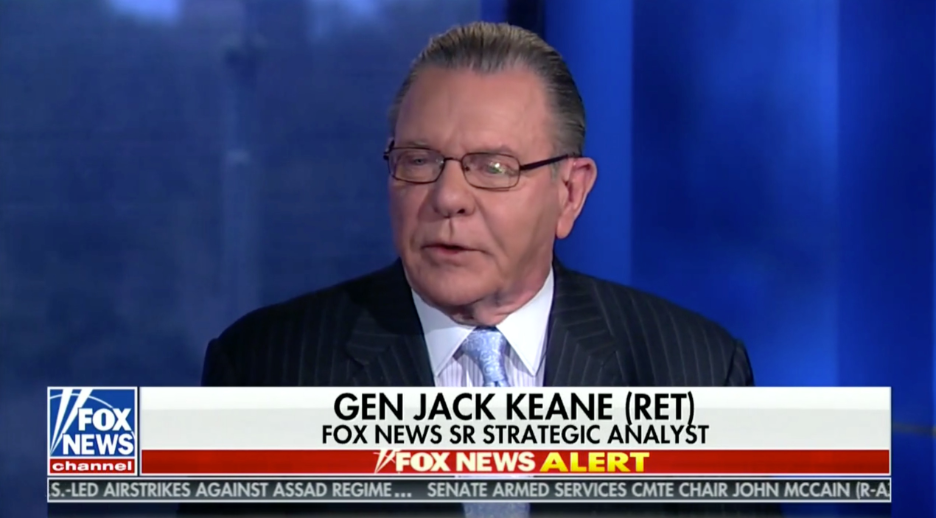
The Smith-Mundt Modernization Act of 2012 allowed government to increase its propaganda in corporate media. Drawing funding from the wealthy donor class and large corporate interests, National Public Radio is similarly confined. NPR’s new CEO as of September 2019 is John Lansing, who recently led U.S. propaganda at the U.S. Agency for Global Media.

Other industry pressure comes in the form of funding and running pressure groups [e.g. National Defense Industrial Association (NDIA), Aerospace Industries Association (AIA), Association of the United States Army (AUSA)] to dominate the Pentagon, administer arms fairs, and push favorable policies; funding think tanks to keep the narrative neoliberal and pro-war; recruiting retired generals and admirals (e.g. Dunford at Lockheed Martin, Mattis at General Dynamics, Winnefeld at Raytheon) to leverage their knowledge for financial gain; and flooding the Pentagon’s civilian offices with corporate executives (e.g., Esper and then Austin, Secretary of Defense; Lord, Undersecretary for Acquisition and Sustainment; McCarthy, Secretary of the Army).

Wars must be created and expanded, and military bases, through which to route goods and services, must be established and entrenched to satisfy investors. Notwithstanding, ending the wars first requires addressing the embedded profit motive, otherwise it is business as usual.

Christian Sorensen is an Air Force veteran and author of the new book entitled Understanding the War Industry. See CAM’s review of the book: Wars R Us: A Review of Christian Sorensen’s New Book.
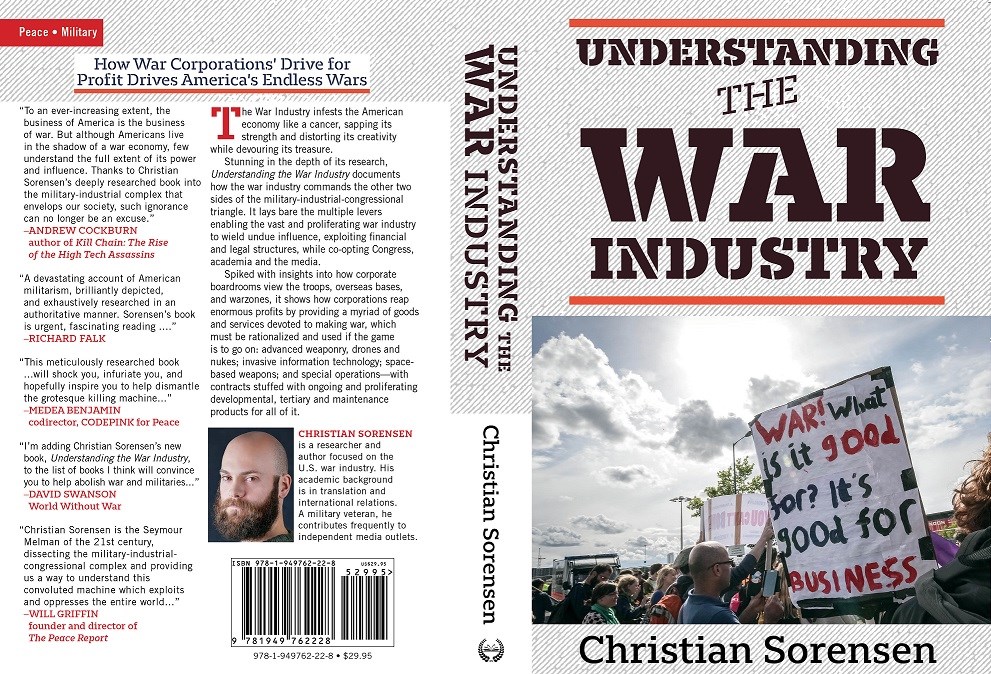
CovertAction Magazine is made possible by subscriptions, orders and donations from readers like you.
Blow the Whistle on U.S. Imperialism
Click the whistle and donate
When you donate to CovertAction Magazine, you are supporting investigative journalism. Your contributions go directly to supporting the development, production, editing, and dissemination of the Magazine.
CovertAction Magazine does not receive corporate or government sponsorship. Yet, we hold a steadfast commitment to providing compensation for writers, editorial and technical support. Your support helps facilitate this compensation as well as increase the caliber of this work.
Please make a donation by clicking on the donate logo above and enter the amount and your credit or debit card information.
CovertAction Institute, Inc. (CAI) is a 501(c)(3) non-profit organization and your gift is tax-deductible for federal income purposes. CAI’s tax-exempt ID number is 87-2461683.
We sincerely thank you for your support.
Disclaimer: The contents of this article are the sole responsibility of the author(s). CovertAction Institute, Inc. (CAI), including its Board of Directors (BD), Editorial Board (EB), Advisory Board (AB), staff, volunteers and its projects (including CovertAction Magazine) are not responsible for any inaccurate or incorrect statement in this article. This article also does not necessarily represent the views the BD, the EB, the AB, staff, volunteers, or any members of its projects.
Differing viewpoints: CAM publishes articles with differing viewpoints in an effort to nurture vibrant debate and thoughtful critical analysis. Feel free to comment on the articles in the comment section and/or send your letters to the Editors, which we will publish in the Letters column.
Copyrighted Material: This web site may contain copyrighted material the use of which has not always been specifically authorized by the copyright owner. As a not-for-profit charitable organization incorporated in the State of New York, we are making such material available in an effort to advance the understanding of humanity’s problems and hopefully to help find solutions for those problems. We believe this constitutes a ‘fair use’ of any such copyrighted material as provided for in section 107 of the US Copyright Law. You can read more about ‘fair use’ and US Copyright Law at the Legal Information Institute of Cornell Law School.
Republishing: CovertAction Magazine (CAM) grants permission to cross-post CAM articles on not-for-profit community internet sites as long as the source is acknowledged together with a hyperlink to the original CovertAction Magazine article. Also, kindly let us know at info@CovertActionMagazine.com. For publication of CAM articles in print or other forms including commercial internet sites, contact: info@CovertActionMagazine.com.
By using this site, you agree to these terms above.
About the Author

Christian Sorensen is an Air Force veteran and a senior fellow at the Eisenhower Media Network (EMN), an organization of independent veteran military and national security experts.
Sorensen is the author of Understanding the War Industry.
As a novelist and independent journalist, Sorensen focuses on war profiteering within the military-industrial-congressional complex.
His work is available at www.warindustrymuster.com.



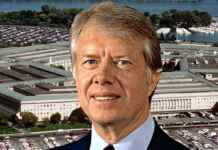
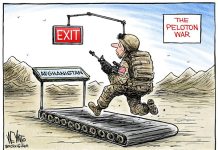






[…] understanding it.” With this in mind, it is easy to understand why a small but powerful class of war profiteers might not acknowledge or seek to educate the public about the nefarious nature and immorality of […]
[…] donations, and the revolving door between the large military contractors and Pentagon.” (See Christian Sorensen’s CAM article for more details on War […]
[…] donations, and the revolving door between the large military contractors and Pentagon.” (See Christian Sorensen’s CAM article for more details on War […]
[…] donations, and the revolving door between the large military contractors and Pentagon.” (See Christian Sorensen’s CAM article for more details on War […]
The taxpayers are on the hook for the war debt created, That debt is created by the banks, not the taxpayers, the banks create ALL the money as debt, i.e. credit used for money. This gives them power over government and industry which they ruthlessly exercise.
[…] Who Are the Ultimate War Profiteers? U.S. Air Force Veteran Removes the Veil CovertActionMagazine (Kevin W) […]
[…] Who Are the Ultimate War Profiteers? U.S. Air Force Veteran Removes the Veil CovertActionMagazine (Kevin W) […]
[…] War is a racket, claims defense industry analyst. “Wall Street plays the foundational role in the war industry by outright owning war corporations…. Big Finance sits at the top of the war industry by purchasing most shares of war corporations and by owning war corporations. Insatiable demand for profit places immense structural pressure on the Pentagon and Capitol Hill for sky-high U.S. military and intelligence budgets, broad deployment of troops overseas, and the opening up of governmental jobs to corporations…. Wars must be created and expanded, and military bases, through which to route goods and services, must be established and entrenched to satisfy investors.” https://covertactionmagazine.com/2021/02/10/who-are-the-ultimate-war-profiteers-a-u-s-air-force-vete… […]
Qui sont les ultimes profiteurs de la guerre ? Un vétéran de l’armée de l’air américaine lève le voile
Par Christian Sorensen – 10 février 2021
Alors que les sociétés de guerre, ou ce qu’on appelle les “entrepreneurs de la défense”, font des milliards de profits, Wall Street est le bénéficiaire ultime des guerres sans fin d’aujourd’hui. La nature prosaïque des profits de guerre – loin du travail d’une sombre cabale – est précisément la raison pour laquelle la collusion est si destructrice et devrait être interdite.
La classe dirigeante américaine déploie l’armée pour trois raisons principales : (1) pour ouvrir de force les pays aux investissements étrangers, (2) pour assurer la libre circulation des ressources naturelles du Sud vers les multinationales, et (3) parce que la guerre est rentable. La troisième de ces raisons, la rentabilité de la guerre, manque souvent de détails dans les analyses de l’impérialisme américain : L’industrie financière, y compris les banques d’investissement et les sociétés de capital-investissement, est une force insatiable qui recherche le profit par le biais de l’activité militaire.
L’industrie de la guerre est composée de sociétés qui vendent des biens et des services au gouvernement américain et aux régimes capitalistes alliés dans le monde entier. Les banques d’investissement et les sociétés de gestion d’actifs détiennent la plupart des actions de toutes les grandes sociétés de guerre publiques.
Parmi les sociétés financières les plus connues qui détiennent des actions de sociétés de guerre, on trouve Vanguard Group, BlackRock, State Street, JPMorgan Chase, Wells Fargo et Wellington Management.
Prenons l’exemple de Parsons, une société qui vend des biens et des services liés à la construction, au commandement et au contrôle, à l’espionnage et aux opérations militaires quotidiennes. L’introduction en bourse de Parsons en mai 2019, évaluée à environ 3 milliards de dollars, lui a valu un prix de la croissance des entreprises du secteur. Les principaux détenteurs d’actions Parsons sont des banques d’investissement et des sociétés de gestion d’actifs, dont les célèbres Vanguard Group, BlackRock et State Street.
Les cyber-guerres et le renseignement deviennent les nouvelles frontières des entreprises
De nouveaux secteurs d’activité de la guerre sont créés puis inondés. Par exemple, la fourniture de “cyber” était pratiquement inexistante dans les contrats militaires américains jusqu’à il y a environ quatre ans. La poussée de l’industrie de la guerre pour militariser l’infrastructure informatique a donné lieu à une véritable manne de cyber-contrats. Aujourd’hui, les biens et services “cyber” sont vendus seuls ou en complément de contrats antérieurs.
Presque toutes les grandes entreprises de guerre vendent des biens et des services informatiques.
Parmi les principales entreprises de guerre publique, on trouve Lockheed Martin, Raytheon Technologies, Boeing, General Dynamics, Northrop Grumman, L3Harris, Textron, SAIC, Booz Allen Hamilton, Leidos, CACI, Honeywell, PAE, Accenture, KBRWyle, Amentum, Jacobs et AECOM.
Ils vendent tous du cyber. La principale exception est Huntington Ingalls, un grand constructeur naval, qui ne vend pas de biens cybernétiques autonomes, bien qu’il impose la cybersécurité comme faisant partie de sa chaîne d’approvisionnement. Les principales sociétés de guerre privées, Sierra Nevada Corp. et General Atomics, dirigées respectivement par le milliardaire Ozmens et Blue Brothers, vendent également des biens et des services informatiques.
Ce seul secteur commercial de la guerre, la cybernétique, représente des milliards d’euros par an. Les affirmations des pirates informatiques chinois et russes, fabriquées ou diffusées par les groupes de réflexion de l’industrie de la guerre et les médias affiliés, alimentent les achats de biens et de services informatiques par le gouvernement. Pour sa part, le gouvernement américain – le premier à utiliser de nouvelles armes dévastatrices, des armes atomiques aux cyberarmes, et le premier à attaquer Moscou avec des cyberarmes – positionne son agression comme purement défensive.
Les accusations de piratage informatique russe soutiennent l’investissement massif dans la cyber-sécurité. [Source : theintercept.com]
En novembre 2018, M. Parsons, dont la direction est composée de banquiers, de profiteurs de guerre de carrière, de militaires, de retraités des services de renseignement et d’un magnat du charbon, a été engagé pour planifier une mission d’opérations dans le cyberespace à Centerville, en Virginie. En mai 2019, Parsons a été engagé par neuf autres entreprises pour développer la dorsale du cyberespace du Naval Information Warfare Center Pacific de San Diego, en Californie, une unité militaire dont le mandat est de dominer toutes les formes d’espace (cyberespace, espace aérien et orbite terrestre).
En janvier 2020, Parsons et d’autres sociétés ont été engagées par la même unité pour développer, superviser et utiliser une large technologie cybernétique faisant partie intégrante de ce mandat, des États-Unis continentaux à Guam, au Japon, en Australie et à Singapour, en passant par le Bahreïn, Djibouti et l’Italie. Ce n’est là qu’un exemple d’une entreprise. Corporate America couvre les cyber-opérations militaires américaines dans le monde entier.
Aucun secteur d’activité de la guerre n’est à l’abri.
Au début des années 1990 encore, on considérait comme un sacrilège le fait que des employés d’entreprises (“contractants”) soient impliqués dans des affaires de renseignement. Ce n’est plus le cas aujourd’hui. Le renseignement américain (tant civil que militaire) est corporatisé.
Prenons l’exemple de la Defense Intelligence Agency. La DIA a été créée dans les années 1960 pour regrouper les activités disparates de renseignement de l’armée. Elle n’a pas beaucoup consolidé, car les différentes branches militaires ont continué à mener des opérations de renseignement militaire distinctes.
Depuis les années 1960, la DIA s’est considérablement développée. Les sociétés qui ont mené les activités de la DIA au cours du dernier exercice financier ont notamment travaillé au sein de sa direction des sciences et des technologies (cinq ans, 990 000 000 $), de son centre national d’exploitation des médias et de son centre de renseignement sur les missiles et l’espace (MSIC).
Parsons effectue des travaux de modélisation, de simulation et d’analyse au sein du MSIC de la DIA. Les entreprises s’occupent également de la planification et de l’analyse de la main-d’œuvre de la DIA, vendent un soutien technique à la DIA, mènent des enquêtes sur les employés et sur leurs antécédents, et travaillent à l’analyse et à l’évaluation des transferts de technologie.
Les entreprises développent et exploitent même des logiciels qui aident “à l’identification des besoins en matière de renseignement, à la gestion des priorités, à la planification et à la production de produits de renseignement, à l’analyse des données d’entreprise, à la communication et à d’autres processus associés”, offrant ainsi aux entités avides de profits de nouvelles possibilités de diriger le navire d’espionnage. Des sociétés (par exemple, Accenture, Booz Allen Hamilton, CACI, General Dynamics, Leidos, L3Harris, ManTech, PAE et SAIC, dont les actions sont principalement détenues par des sociétés financières) dirigent fonctionnellement le renseignement militaire américain, dont les opérations enrichissent en fin de compte la classe dirigeante américaine.
Wall Street : les ultimes profiteurs de la guerre
Wall Street joue le rôle fondamental dans l’industrie de la guerre en possédant des sociétés de guerre. Prenons l’exemple de PAE, une société subtile et puissante, qui exploite des secteurs d’activité de guerre aussi divers que la maintenance des véhicules, les opérations de base, la construction militaire et la formation militaire. Gores Holdings III a racheté PAE à Platinum Equity au début de l’année 2020. Gores a ensuite adopté le nom PAE et a fait entrer PAE en bourse. PAE a depuis lors acquis les sociétés CENTRA et Metis Solutions, qui augmentent encore les opérations de PAE en accomplissant d’anciennes tâches gouvernementales au sein de l’establishment militaire américain et des agences d’espionnage.
Là encore, toutes les activités militaires et de renseignement sont à saisir, même le Centre d’essai et d’évaluation sous-marin atlantique (AUTEC), un champ de tir militaire pour tester et évaluer la technologie de l’industrie de guerre (par exemple, les armes anti-sous-marines, la localisation par sonar et les communications). Certains ont surnommé AUTEC la “zone 51 de la marine” en raison des essais d’armes non conventionnelles de haute technologie. [La zone 51 est un champ de tir du Nevada où l’on travaille sur des programmes classifiés et où l’on fait voler des avions expérimentaux].
La marine a créé AUTEC sur l’île d’Andros aux Bahamas pour tirer parti de la profonde tranchée océanique qui longe la côte est de l’île. PAE est traditionnellement la société qui gère et entretient AUTEC, bien qu’une nouvelle société, Amentum, ait récemment repris certaines de ces fonctions.
La société de capital-investissement Lindsay Goldberg est propriétaire d’Amentum, qui a été créée en 2020 lorsque AECOM, une énorme société d’ingénierie et de gestion de projets, a vendu son activité de services de gestion. Amentum dirige aujourd’hui cette entreprise. A l’étranger, cette entreprise de services de gestion a récemment transporté des équipements, des cargaisons et du personnel dans toute l’Europe ; elle a géré la logistique du matériel prépositionné en Allemagne, au Koweït et au Qatar ; elle a soutenu les opérations de drones au Moyen-Orient ; et elle a réparé des équipements de soutien et contribué à la maintenance des sites de la marine à Comalapa, au Salvador. Ces opérations appartiennent maintenant toutes à Amentum.
En novembre 2020, Amentum a fait un autre pas en avant : Elle a racheté DynCorp, une société qui aurait un long passé de mercenaires en Amérique latine et au Moyen-Orient.
Selon les annonces de contrats, DynCorp a récemment supervisé du matériel de réserve de guerre aux États-Unis, au Koweït, à Oman, au Qatar et aux Émirats arabes unis ; assuré la maintenance d’avions militaires dans le monde entier, notamment au Honduras, en Allemagne, en Afghanistan, en Irak et au Koweït ; vendu des services de maintenance d’avions à la Suède et à l’Arabie saoudite ; et assuré une formation et un équipement substantiels des forces, des constructions d’urgence et de la logistique dans le monde entier.
La Big Finance dirige et négocie des sociétés de guerre, considérant les bases, les troupes et les zones de guerre comme des chiffres dont elle peut tirer profit.
Un autre acteur financier de premier plan est Veritas Capital, qui possédait autrefois DynCorp et qui possède maintenant des sociétés telles qu’Alion et Peraton, cette dernière étant sur le point d’acquérir les activités informatiques de Northrop Grumman. Les ventes récentes de Peraton à l’establishment militaire américain ont inclus : des systèmes portables pour déjouer les engins explosifs radiocommandés que divers groupes utilisent pour attaquer les forces militaires occidentales qui envahissent ou occupent leurs pays ; des travaux sur les drones sous-marins ; des travaux pour s’assurer que les missiles nucléaires rentrent correctement dans l’atmosphère terrestre ; des travaux informatiques qui “soutiennent directement les intérêts de sécurité nationale américains sur le continent africain”, selon l’annonce du contrat ; des cyberactivités pour le laboratoire de recherche de l’armée de l’air ; et des communications commerciales par satellite pour le commandement central. Tout est juste dans le profit et la guerre.
La Big Finance se situe au sommet de l’industrie de la guerre en achetant la plupart des actions des sociétés de guerre et en possédant des sociétés de guerre. La demande insatiable de profit exerce une pression structurelle immense sur le Pentagone et le Capitole pour obtenir des budgets militaires et de renseignement américains très élevés, un large déploiement de troupes à l’étranger et l’ouverture des emplois gouvernementaux aux entreprises.
La pression la plus connue de l’industrie prend la forme de lobbying auprès des deux partis politiques et du financement de leurs campagnes au Congrès (avec un accent particulier sur les membres des comités pertinents, tels que les services armés, le renseignement, les crédits et les relations étrangères).
Cela donne des résultats tangibles. Comme l’a calculé Steven Semler, de l’Institut de réforme de la politique de sécurité non corporative, les votes des démocrates sur la loi d’autorisation de la défense nationale sont en forte corrélation avec les membres de l’industrie de la guerre qui ont accepté de l’argent liquide pour leur campagne. En moyenne, les démocrates qui ont voté pour le NDAA ont accepté quatre fois plus d’argent de l’industrie de la guerre que ceux qui ont voté contre. Au Sénat, les démocrates qui ont voté en faveur de la loi ont accepté six fois plus d’argent de l’industrie de guerre.
Le plus guerrier en chef
Le pouvoir exécutif n’est pas exempté. Les financiers rapides – y compris les chefs de fonds spéculatifs et les investisseurs en capital-risque – sont les premiers donateurs de l’administration Biden, bien que les groupes de “dark money” empêchent de bien comprendre le financement global de la campagne. Entre juillet et septembre, au moins 67 milliardaires et leurs conjoints ont versé des contributions de plus de 100 000 dollars à des comités soutenant Joe Biden et le Parti démocrate, selon les dossiers déposés auprès de la Commission électorale fédérale.
La campagne de Biden a reçu plus de 9 millions de dollars de Donald Sussman, PDG de Palmora Partners, un fonds spéculatif de plusieurs milliards de dollars, qui possède plus de 260 000 actions de Raytheon, un fabricant d’armes prééminent et fournisseur d’armes à l’Arabie Saoudite, qui a récemment remporté un contrat de 100 millions de dollars pour la formation de l’armée de l’air afghane.
Un autre des principaux donateurs de Biden, Jim Simons, qui a donné plus de 7 millions de dollars, a fondé Renaissance Capital, qui possède 1,2 million d’actions de Raytheon d’une valeur de plus de 75 millions de dollars, et 130 000 actions de Lockheed Martin d’une valeur de 50 millions de dollars.
Big Tech occupe une place de choix parmi les donateurs à la célébration de l’inauguration de Biden. Biden a été clair sur la campagne : il n’a pas l’intention de réduire le budget militaire, allant même jusqu’à déclarer : “J’ai rencontré un certain nombre de mes conseillers et certains ont suggéré que dans certains domaines, le budget devra être augmenté”. Les conseillers de Biden font partie intégrante du complexe militaro-industriel-congressionnel. S’adressant à de riches donateurs, M. Biden leur a tristement assuré que “rien ne changerait fondamentalement” dans une présidence Biden.
Médias institutionnels Kool-aid
Les médias institutionnels empêchent le public de comprendre la nature du problème. Une poignée d’intérêts commerciaux possède des médias aux États-Unis. Le profit est le moteur des médias institutionnels. Les médias institutionnels américains (par exemple CNN, MSNBC, FoxNews) partagent le même modèle économique : diffuser ce qui attire le plus d’audience afin d’obtenir plus de revenus publicitaires.
Les médias institutionnels diffusent de l’info-divertissement, qui n’a pas pour but d’informer ou d’encourager la pensée critique. Informer le public n’est pas une priorité. Le maintien de l’ordre économique existant l’est.
Dans la mesure où les médias institutionnels diffusent une information quelconque, celle-ci reflète les opinions de la classe dirigeante et le dogme de l’Amérique des affaires.
En conditionnant politiquement le public américain, les médias institutionnels ne blâment jamais le complexe militaro-industriel-congressionnel ou le capitalisme pour aucun des problèmes du monde. Visant des taux d’audience élevés et des revenus publicitaires lucratifs, les médias institutionnels s’autocensurent et réduisent le spectre des débats de politique étrangère acceptables. Les sociétés de guerre achètent des publicités dans les émissions d’information des entreprises pour confiner encore plus le débat. Les experts et les présentateurs de nouvelles des entreprises ne s’expriment pas contre les annonceurs.
Les médias institutionnels engagent des militants de carrière (par exemple, l’ancien directeur de la CIA John Brennan, MSNBC ; l’ancien directeur adjoint de la CIA Mike Morrell, CBS News ; le général à la retraite Jack Keane, FoxNews) qui restreignent encore plus le débat. Les généraux et amiraux à la retraite contribuent régulièrement à toutes les formes de médias institutionnels, souvent sans révéler les liens existants avec les sociétés de guerre ou les investissements financiers dans la guerre.
La loi de modernisation Smith-Mundt de 2012 a permis au gouvernement d’accroître sa propagande dans les médias institutionnels. Tirant son financement de la classe des riches donateurs et des intérêts des grandes entreprises, la Radio publique nationale est également confinée. Le nouveau PDG de NPR à partir de septembre 2019 est John Lansing, qui a récemment dirigé la propagande américaine à l’Agence américaine pour les médias mondiaux.
L’industrie exerce également des pressions sous la forme de financement et de gestion de groupes de pression [par exemple, la National Defense Industrial Association (NDIA), l’Aerospace Industries Association (AIA), l’Association of the United States Army (AUSA)] pour dominer le Pentagone, gérer des salons de l’armement et promouvoir des politiques favorables, financer des groupes de réflexion pour maintenir le discours néolibéral et pro-guerre, recruter des généraux et des amiraux à la retraite (e. Dunford chez Lockheed Martin, Mattis chez General Dynamics, Winnefeld chez Raytheon) pour tirer parti de leurs connaissances en vue d’un gain financier ; et inonder les bureaux civils du Pentagone de cadres d’entreprises (par exemple Esper puis Austin, secrétaire à la défense ; Lord, sous-secrétaire à l’acquisition et au maintien en puissance ; McCarthy, secrétaire de l’armée).
Des guerres doivent être créées et étendues, et des bases militaires, par lesquelles transiteront les biens et les services, doivent être établies et ancrées pour satisfaire les investisseurs. Néanmoins, pour mettre fin aux guerres, il faut d’abord s’attaquer à la motivation du profit, sinon c’est la routine.
Christian Sorensen est un vétéran de l’armée de l’air et l’auteur du nouveau livre intitulé Understanding the War Industry. Voir la critique du livre par le CAM : Wars R Us : Une critique du nouveau livre de Christian Sorensen.
https://covertactionmagazine.com/2021/02/10/who-are-the-ultimate-war-profiteers-a-u-s-air-force-veteran-removes-the-veil/?fbclid=IwAR2p-4fjc__y5BPMW5D045reQJOzHiah5m1HIc1IaqH0pPLz0nQXm08FYJU
[…] Article: Who Are the Ultimate War Profiteers? A U.S. Air Force Veteran Removes the Veil by Christian Sorensen […]
Very informative article.
If you don’t mind, I would like to get off-topic. Your readers should know that Judge Juan Guzman, the prosecutor of Chilean General Augusto Pinochet, died a few days ago. When I was conducting research for my dissertation in the summer of 2005, Guzman kindly granted me an interview in his Santiago home. In the course of the interview, I remarked rather thoughtlessly: “Chile is a civilized country. I can’t believe a coup happened here. I feel as safe as I do in the United States!” Professor Guzman scolded me: “Don’t be so bragging! What about Guantanamo? Injustice can happen anywhere.” After the events of January 6th, I thought about writing to him that he had been right.
To honor his memory, this documentary has been posted on-line for free:
https://www.youtube.com/watch?v=2v7yTGnb970
Your last paragraph should have included —- its not ‘governments’/politicians that pay—only TAXPAYERS—and yet most of the security tools are for controlling/via/spying on taxpayers, because we are the payers.
So why constantly use the phrase governments–doing-approving-allocating–propagandizing — nothing happens unless taxpayers pay–(best example – cleaning up corporate pollution). Why then, can we not compel AI to go against the ‘forces’ and setup an app which lets individuals direct their tax payments to the specific programs/services they choose—only.
The alternative is obvious, which is why corporations through trade agreements and /Rumsfeld’s/hollowing-out-of-/governmental-programs-services/for/corporate/profit/&/control)– . Leaving corporations to freely target local, state and federal contract/tendering competitions–(for the taking)–all -guaranteed by trade agreements. By-passing any and all laws and regulations. Now, public services/programs are being flipped into privately owned— for profit only services/programs).
So taxpayers will be forced to pay the going-rate set by these same corporations, in order to continue to survive. Is it no wonder that some mega banks were reported scouring the landscape for utilities and airports in order to secure (rate power over surrounding taxpayers)?
Comment please, and do take care….thank you for your research and insights.